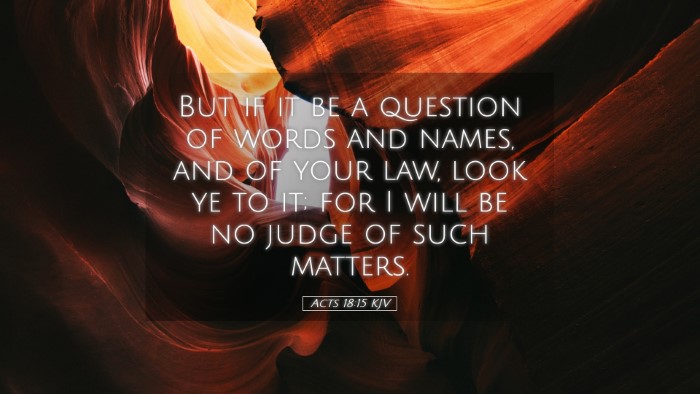Commentary on Acts 18:15
In Acts 18:15, the Apostle Paul finds himself in the midst of a legal dispute that reflects the broader tensions of the early Christian church within the Roman Empire. The verse reads:
"But if it be a question of words and names, and of your law, look ye to it; for I will be no judge of such matters."
This statement is significant not only for its context within Paul's missionary work but also for the implications it holds regarding the relationship between faith and civil authority. Below, we explore various insights from well-regarded public domain commentaries.
Contextual Overview
Before delving into specific interpretations, it is essential to consider the surrounding narrative. Paul is in Corinth, a city known for its diverse population and moral challenges. He has been preaching the Gospel, leading to both conversions and opposition. The verse reflects a situation where the Jewish leaders bring Paul before Gallio, the proconsul, accusing him of promoting unlawful worship.
Insights from Matthew Henry
Matthew Henry emphasizes the wisdom displayed by Gallio in this situation. According to Henry, Gallio's dismissal of the case showcases an understanding that the disputes concerning faith should not bother civil authorities:
"Gallio understood that the matter in question was not civil disobedience but rather an internal religious dispute. He wisely refrained from entangling himself in matters of Jewish law."
This perspective aligns with the emerging Christian view that the Gospel transcends personal and national laws, encouraging believers to focus on spiritual truths rather than engaging in contentious legalities.
Albert Barnes' Perspective
Albert Barnes offers a detailed exposition of the implications of Paul's situation. He notes:
"Paul's words reveal a critical distinction between civic law and divine law. Gallio's indifference towards the accusations demonstrates a broader Roman policy of tolerance towards various religions as long as they did not disrupt peace."
Barnes underscores the importance of this separation, noting that while Christians are called to obey civil authorities, they must recognize the boundaries of earthly laws in comparison to divine command. Barnes suggests that Christians, including Paul, were often caught in cultural conflicts regarding their beliefs.
Adam Clarke's Exegesis
Adam Clarke provides a thorough analysis of the language and context of Acts 18:15. He points out:
"The phrase 'look ye to it' indicates a passing of responsibility. Paul was not defying civil order but clarifying the nature of the accusations—merely disputes over internal religious disagreements."
Clarke's commentary highlights the procedural nature of the Roman legal system which often required clarity and substance in accusations. Paul's refusal to be involved in such religious disputes illustrates a strategic approach, allowing him to focus on his mission rather than becoming distracted by legal entanglements.
Implications for Theological Reflection
- The Role of Civil Authorities: This passage prompts pastors and theologians to consider how the church interacts with civil government.
- Defining the Gospel's Place: What does it mean for the church when legal issues arise that could potentially compromise the mission of Christ?
- Clear Distinctions: The commentary encourages believers to maintain clarity between spiritual authority and earthly governance.
- Dispelling Confusion: There is a necessity to communicate effectively about the nature of faith, avoiding unnecessary disputes over cultural specifics that may be peripheral to the Gospel.
Practical Applications
In light of Acts 18:15 and the accompanying commentaries, there are several applications for today's Christian leaders:
- Focus on the Mission: Like Paul, pastors should prioritize the proclamation of the Gospel over engaging in peripheral disputes that can distract the congregation.
- Encouragement in Cultural Conflicts: This passage serves as a reminder for believers to remain steadfast amid cultural opposition, trusting in the wisdom of divine oversight.
- Encourage Dialogue Over Division: The church should foster environments where individuals can share differing views within a spirit of love and unity.
- Educating the Congregation: Christians should be equipped to understand the relationship between their faith and citizenship, knowing when to engage and when to refrain from conflicts.
Conclusion
The commentary on Acts 18:15 provides profound insights into how the early church navigated the complexities of living out their faith within a legal framework. The wisdom of Gallio serves as a reminder of the necessity of prudence in legal matters that involve faith. For modern readers, there is a rich tapestry of lessons—embracing the mission, maintaining clarity, and understanding the nuanced roles of civil and spiritual authority.


